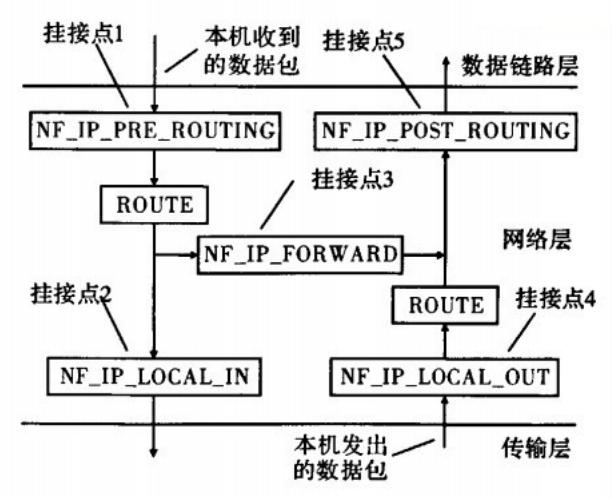下图是Netfilter的IPV4下的结构

可以看到这是基于早期版本内核的,如今内核挂载点的宏定义发生了变化,从NF_IP_XXX => NF_INET_XXX
每个注册的钩子函数经过处理后都将返回下列值之一,告知Netfilter核心代码处理结果,以便对报文采取相应的动作:
NF_ACCEPT:继续正常的报文处理;
NF_DROP:将报文丢弃;
NF_STOLEN:由钩子函数处理了该报文,不要再继续传送;
NF_QUEUE:将报文入队,通常交由用户程序处理;
NF_REPEAT:再次调用该钩子函数。
// code
1
2
3
4
5
6
7
8
9
10
11
12
13
14
15
16
17
18
19
20
21
22
23
24
25
26
27
28
29
30
31
32
33
34
35
36
37
38
39
40
41
42
43
44
45
46
47
48
49
50
51
52
53
54
55
| #include <linux/module.h>
#include <linux/init.h>
#include <linux/kernel.h>
#include <linux/net.h>
#include <net/tcp.h>
#include <linux/skbuff.h>
#include <linux/netfilter.h>
#include <linux/netfilter_ipv4.h>
#include <net/ip_vs.h>
#include <net/sock.h>
#include <linux/gfp.h>
#include <linux/kallsyms.h>
#include <linux/version.h>
static unsigned int test_runit(unsigned int hooknum,
#if LINUX_VERSION_CODE < KERNEL_VERSION(2, 6, 32)
truct sk_buff **skb,
#else
struct sk_buff *skb,
#endif
const struct net_device *in,
const struct net_device *out,
int (*okfn)(struct sk_buff *))
{
...
return NF_ACCEPT;
}
static struct nf_hook_ops hook_test = {
.hook = test_runit,
.owner = THIS_MODULE,
.pf = PF_INET,
#if LINUX_VERSION_CODE < KERNEL_VERSION(2, 6, 32)
.hooknum = NF_IP_LOCAL_OUT,
#else
.hooknum = NF_INET_LOCAL_OUT,
#endif
.priority = 100,
};
static int __init test_start_init(void)
{
printk("Hi test pre\n");
nf_register_hook(&hook_test);
return 0;
}
static void __exit test_start_exit(void)
{
nf_unregister_hook(&hook_test);
printk("Bye test pre\n");
}
module_init(test_start_init);
module_exit(test_start_exit);
MODULE_LICENSE("GPL");
|


